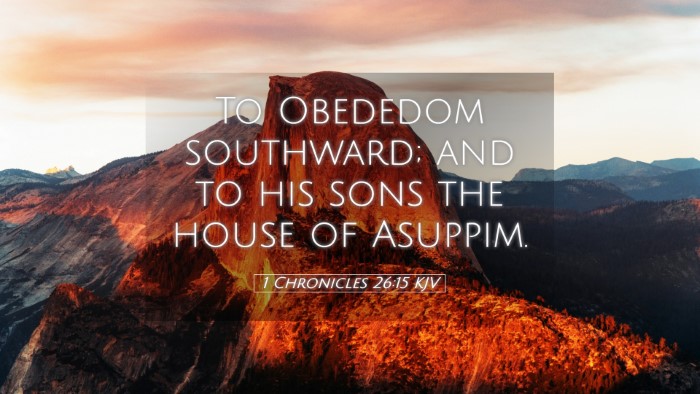Bible Commentary on 1 Chronicles 26:15
1 Chronicles 26:15 states: "The Eastern gate was for the priests in charge of the temple and the gatekeepers." This verse, while concise, carries profound implications regarding the organization of temple service and the sacred responsibilities assigned to individuals in the worship of God.
Contextual Overview
The Chronicles, as historical narratives, emphasize God's covenant with Israel, the significance of the temple, and the roles within the Levitical order. This particular verse touches on the roles of the gatekeepers, a function critical for the maintenance of sanctity and order in worship.
Commentary Insights
Matthew Henry indicates that the gatekeepers played a vital role in the temple service, highlighting their duties as protectors of the sanctity of the temple. Their watchfulness was not merely for physical security but also ensured that the spiritual atmosphere remained pure and conducive for worship. Their placement at the gates represents both physical and spiritual boundaries, a reminder that access to sacred spaces requires reverence and preparation.
Albert Barnes expounds upon the significance of the Eastern gate, noting that this gate held symbolic importance, often representing new beginnings and the dawn of a new day in worship. In the context of the temple, this aligns with the idea of renewal and the daily offering of worship, implying that every day presents believers with the opportunity to engage in fresh spiritual practices. Barnes emphasizes the importance of the priests at this gate, underlining that they were essential in mediating the relationship between God and the people, embodying holiness in their functions.
Adam Clarke focuses on the Levitical duties associated with the gatekeepers, mentioning how their role was critical to the orderly execution of the rituals and sacrifices. Clarke draws attention to the qualifications required of those who maintained such important roles, suggesting that only those who were spiritually attuned could fulfill these duties effectively. This illustrates the broader biblical principle that serves as a foundation for all ministry: that only those whose hearts are inclined towards God can honestly serve Him and guide others.
Theological Implications
The position of the gatekeeper among the priests highlights several theological truths essential to the Christian faith:
- Access to God: The concept of access to the temple through the East gate draws a parallel to Christ as the gate through which believers enter into fellowship with God (John 10:9). The priests' role as gatekeepers signifies the need for a mediator in approaching a holy God, which is fully realized in Jesus Christ.
- Holiness and Order in Worship: The strict assignments and duties of the priests underscore God's demand for holiness and order within His worship. The Church today can glean from this, ensuring that worship practices are intentional, sacred, and reflective of God's character.
- The Role of Leadership in the Church: The gatekeepers, although often seen as lowly servants, were critical in facilitating worship. This relates to the theology of servant leadership in the Church, illustrating that spiritual authority is characterized by service and stewardship over God's people.
Practical Application
For contemporary believers, there are several applications stemming from 1 Chronicles 26:15:
- Cultivating Watchfulness: Just as gatekeepers were called to vigilance, so too must believers be watchful in their spiritual lives. This includes guarding against distractions, temptations, and anything that would hinder worship.
- Encouragement in Service: The servant roles within the Church, much like those of the gatekeepers, should be approached with reverence and dedication. Every role, no matter how small, contributes to the larger framework of worship and ministry.
- Commitment to Holiness: The call to uphold holiness in our worship practices remains relevant. This encourages believers to reflect on their own lives, ensuring that they approach God with pure hearts and intentions.
Conclusion
In summary, 1 Chronicles 26:15 serves as a powerful reminder of the structure, order, and sacredness instilled in the worship of God through the life of Israel and its priests. Drawn from the insights of esteemed commentators such as Matthew Henry, Albert Barnes, and Adam Clarke, it invites reflection on the continuous responsibility of believers to uphold God's holiness within their worship practices and communal services. The gatekeepers' role echoes through history, calling Christians today to be vigilant, dedicated servants in the temple of the Holy Spirit.


